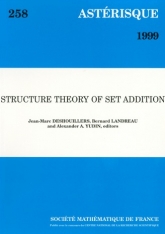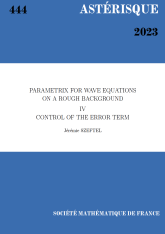
- Consulter un extrait
- Année : 1999
- Tome : 258
- Format : Électronique, Papier
- Langue de l'ouvrage :
Anglais - Class. Math. : 05-XX, 11Bxx, 11Hxx, 11Lxx, 11Pxx, 20Cxx, 20Dxx, 20Exx, 20Fxx, 60Exx, 60Fxx, 68Qxx, 90Cxx, 94Bxx
- Nb. de pages : 458
- ISSN : 0303-1179
- DOI : 10.24033/ast.436
La théorie additive des nombres, motivée par des conjectures telles que celles de Goldbach ou Waring, s'est longtemps consacrée à l'étude des propriétés additives de suites particulières. Dans les années 1930, on a remarqué que la considération des propriétés additives de suites générales, non seulement constituait un magnifique sujet en lui-même, mais en outre permettait des améliorations dans l'étude de suites particulières : ainsi, dans l'article fondateur de cette problématique, Schnirel'man a introduit une notion de densité sur les suites d'entiers, donné une minoration de la densité de la somme de deux suites et l'a appliquée à l'ensemble des nombres premiers montrant que tout entier peut être représenté comme une somme de nombres premiers, avec un nombre de termes uniformément borné. La théorie additive des nombres a évolué vers la définition d'invariants pour des parties de monoïdes (non nécessairement commutatifs) et l'étude des invariants de la somme d'ensembles en fonction des invariants liés à ces ensembles. Une nouvelle tendance est apparue dans les années 1950, avec les travaux de M. Kneser et G.A. Freiman, que l'on désigne parfois sous le vocable de théorie additive inverse : sachant que le rapport entre les invariants d'une famille d'ensembles et l'invariant de leur somme est extrêmal (ou presque extrêmal), que peut-on dire de la structure des ensembles eux-mêmes ? Cet abord a connu récemment un regain d'intérêt qui se trouve porter ses fruits dans d'autres domaines. Il a semblé judicieux de regrouper en un unique volume 24 articles de recherches originaux et 3 synthèses ayant trait à cette théorie de la structure des sommes d'ensembles et ses applications à la théorie des nombres élémentaire ou combinatoire, à la théorie des groupes, à la programmation entière et à la théorie des probabilités.


